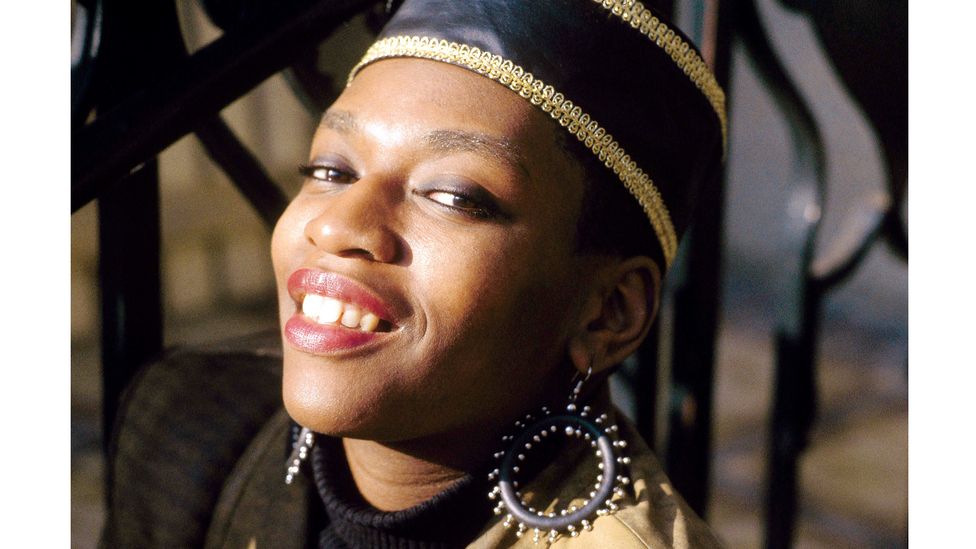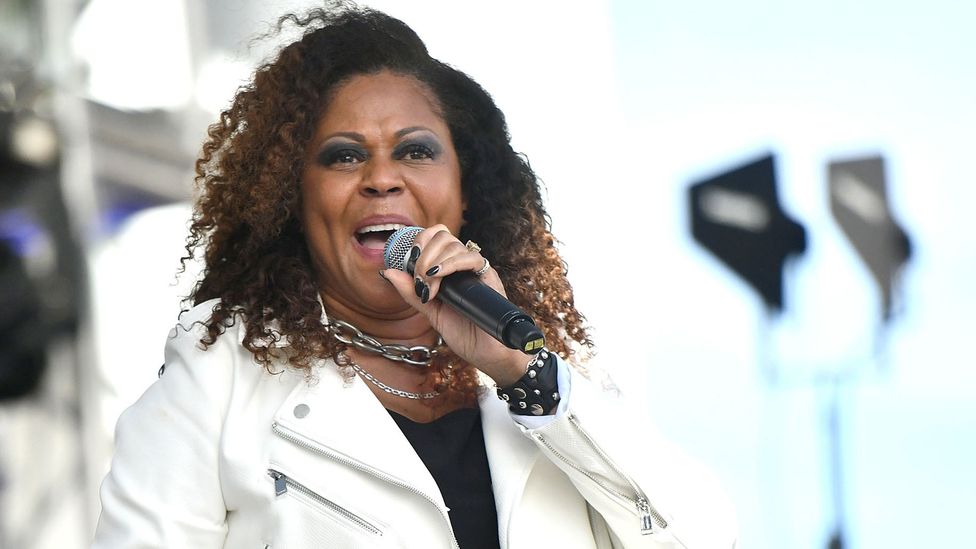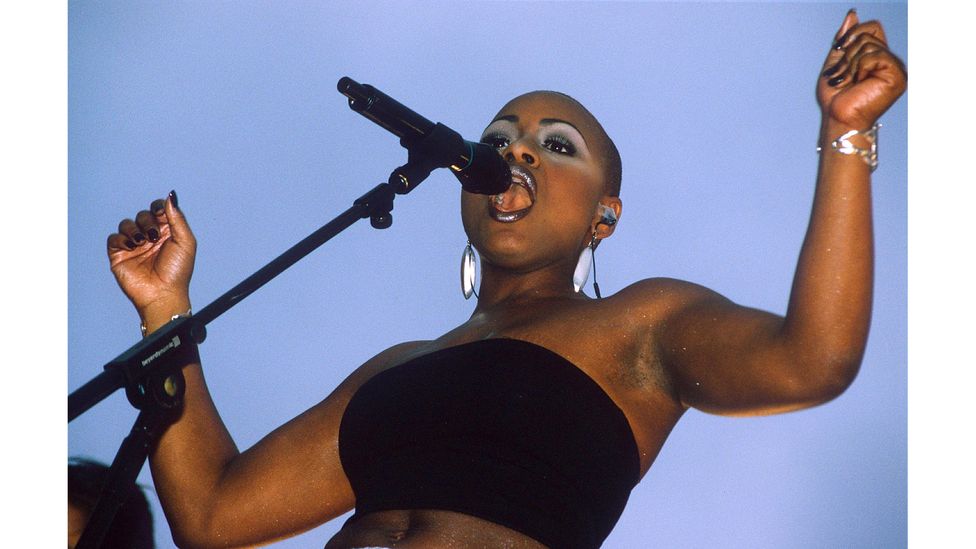The unsung legends of house music

Queen Bey might not have rebirthed 90s club music with her rapturous new album Renaissance, but she has given it her royal warrant. Renaissance seizes that era’s spirit of the dancefloor as an empowering “safe space” for all clubbers, and LGBTQ communities in particular. It uses multi-stranded elements: hi-NRG disco, hip hop, and especially house music, with lead single Break My Soul nodding to US artist Robin S’s 1993 smash hit Show Me Love (StoneBridge mix). It should also elevate the legacy of the original vocalists who were instrumental in shaping this classic dance sound, yet whose contributions have been repeatedly undersung. House is a feeling (as the 90s mantra goes), and these predominantly black female talents super-charged this electronic music with every vital emotion. It’s high time they were paid proper dues.
More like this:
– The ‘scandalous’ life of Ethel Smyth
– The US’s first interracial love song
– Inside Kate Bush’s alternate universe
“I’m very proud of Beyoncé, because she took the chance, and she’s doing this damn thing, the way she wants to do it,” beams Robin Stone (aka Robin S), across a transatlantic Zoom. “And after all these years, people are finally getting to know who Robin S really is.”
Hearing Stone’s vocals in the 90s (as I did, as a fledgling clubber) really did feel revelatory; hearing them afresh in the 21st Century remains a spirit-soaring experience. The late 80s and 90s were thrillingly febrile years for vocal-led dance music; like many of her multi-ranging peers, Stone released numerous tracks, yet was inextricably linked to her commercial breakthrough (pre-Beyoncé, Show Me Love has been sampled by other contemporary artists including Charli XCX).

Adeva – who achieved success with her reworking of Aretha Franklin’s Respect – developed her voice in her church choir (Credit: Getty Images)
If you did a cursory roll-call of that era’s outstanding US and UK voices (and frequently co-writers), it would include the likes of Adeva (Respect, 1988); Martha Wash (originally a disco singer with Sylvester, and The Weather Girls; later featured without credit by Black Box and C+C Music Factory); Crystal Waters (Gypsy Woman, 1991); Angie Brown (Bizarre Inc’s I’m Gonna Get You, 1992); Barbara Tucker (Beautiful People, 1994); Janice Robinson (Livin’ Joy’s Dreamer, 1995); Ultra Naté (Free, 1997). These talents projected positively assertive, heartfelt expressions from the underground dancefloor to prime-time playlists, and if you were lucky to catch them live, it was an epiphany. I’ll never forget watching US singer Kathy Brown tear the roof off a nightclub in Camden, North London when she sang her 1997 house stormer Turn Me Out (Turn to Sugar); the crowds roared and pounded on the walls with excitement until our lungs and fists were raw.
A playlist celebrating the talent and power of some of the women vocalists and songwriters who gave – and still give – classic house music its vital heart and soul
“The 90s was the time that clubs were starting to be taken seriously, as a marketing test bed for music,” says DJ Paulette, a British innovator of that era (thanks to her legendary nights including Flesh at Manchester’s Hacienda, and Go It Girl at Brighton’s Zap Club), and a contemporary club culture “shero”. “Dance tracks weren’t just in the club charts, they were bouncing into the realms of serious sales. Because so many of these singers had a gospel grounding, it also brought the voices of the church to house music: a kind of uplifting purity married to a 4:4 beat. These house vocalists could get album deals in their own right, and a certain number broke through – but not all of them.” According to Stone, “We [vocalists] have always been around; we are the hardest working unappreciated people that you will ever meet. There’s countless of us that have gone unrecognised. But we are a community of love.”
Gaining credit
While male-dominated “superstar DJ” status escalated, black female artists and songwriters repeatedly went overlooked and uncredited in the mainstream, often even having their work sampled without permission (as the majestic Loleatta Holloway initially was, on Black Box’s 1989 house megahit Ride on Time). Ironically, it’s something that Beyoncé has also been accused of with her new album; Kelis hit out on social media after the new song Energy sampled her 2000 track Get Along with You – but failed to credit her. In video statements on Instagram, Kelis argues: “The issue is that not only are we female artists, okay, black female artists in an industry [where] there’s not that many of us… The reality is, all of this female empowerment, it only counts if you really do it.”

Robin Stone’s debut single Show Me Love reached Number 1 in the US dance chart when it was remixed in 1993 (Credit: Getty Images)
For Stone, and many house vocalists, major label success proved creatively restrictive, as the corporate world expected them to reprise the same hit formula (“when I wanted to spread my wings, I was stuffed back into a box,” she says). The generic term “diva” also seemed to eclipse the distinct splendour of individual artists. “I’ve never identified with the term ‘diva’,” says Stone. “I had three little kids at home when Show Me Love came out; after getting onstage, I’d come back to feed my kids and change diapers.” She remains humble, adding that she’s now in her element as an independent artist: “To be standing before audiences at 60 years old is truly a blessing.”
While the lack of industry credit for club vocalists remains an issue (as Jumi Akinfenwa noted in a 2021 Guardian feature), the digital age makes it easier to highlight innovators and share inspirations. “It’s a massively positive thing, because it shows record labels that you don’t have to just put a squeaky young voice on a house track,” says Paulette. “It’s really down to people being as open-minded as they can be with music.”
Voices of club culture
The fantastically far-ranging Mancunian singer-songwriter Rowetta has brought her powerhouse vocals to multi-genre projects, including her work with the Happy Mondays since 1990. She is categorically not a backing singer. She also remains a prominent voice of club culture; a 2008 version of Robin S’s Show Me Love (mixed by Steve Angello and Laidback Luke) opens with Rowetta’s voice (and lyrics) from her 1990 track with Sweet Mercy, Reach Out. It’s a sample she’s now recognised, and rightly paid, for.
Rowetta also recalls clubbing at the Hacienda in the early 90s, and being surprised to hear her voice on hot new dance tracks (which transpired to be Eterna by Slam, and Baby Can You Reach by Limelife). “At the time, I didn’t know you could sample people, or that there was an a capella version of Reach Out circulating,” says Rowetta. “Back then, you couldn’t Google tracks. I later told Todd Terry [the superstar DJ/producer behind Limelife] off, and I’ve done a few tracks with him now. I’ll speak my mind; you can be in awe of someone, but don’t ever lose your true self. I love my work; I don’t care about the famous thing, but I want to be respected for my voice. People that I’ve always wanted to work with are approaching me now.” Rowetta has proved that she can sing pretty much any style, but she retains an emotional connection with house music, because “You can sing as a woman with attitude, whether you’re shouting it out, or singing softly”.

Many of Ultra Naté’s singles have reached the top ten of the US dance chart (Credit: Getty Images)
Another vocal heroine who has remained devoted to house music (both as a singer-songwriter and a DJ) is the redoubtable Ultra Naté, who is preparing to release her latest album, Ultra. “This genre has always given me a vibrant palette to work with,” she explains. “I’ve had freedom to work with all the colours and ideas.” Her work channels an exhilarating energy, which is rooted in her own formative clubbing experiences as a Baltimore teen. “You went into this environment where everyone was united in this spiritual connection through music and dance,” she says. “The energy in the air was palpable.”
Through the dancefloor, she met influential producers the Basement Boys, and wrote her first club classic, It’s Over Now, with them. “We were literally sitting around a kitchen table; the studio was in the basement of Jay’s apartment, they pulled music out of the closet, and the vocal booth was in the bathroom. At a time when house was starting to make the transition from underground music into commercial interest, there were no rules in place. That freedom to just experiment and grow in your art has been lost in music culture now, because major labels expect you to come as a shiny, polished new missile, when you’re still that diamond in the rough.”
Perhaps that off-the-cuff spirit has disappeared, but generations now hear, see and celebrate the original vocalists of house music – and their legacy continues to evolve. “When we wrote Free, we didn’t know if anyone would like the record; it was an intentional risk,” smiles Ultra Naté. “To see that little seed that I planted, and perform it 32 years later with a full orchestra at the Lincoln Centre, that’s the story for me.”
If you would like to comment on this story or anything else you have seen on BBC Culture, head over to our Facebook page or message us on Twitter.
And if you liked this story, sign up for the weekly bbc.com features newsletter, called The Essential List. A handpicked selection of stories from BBC Future, Culture, Worklife and Travel, delivered to your inbox every Friday.








